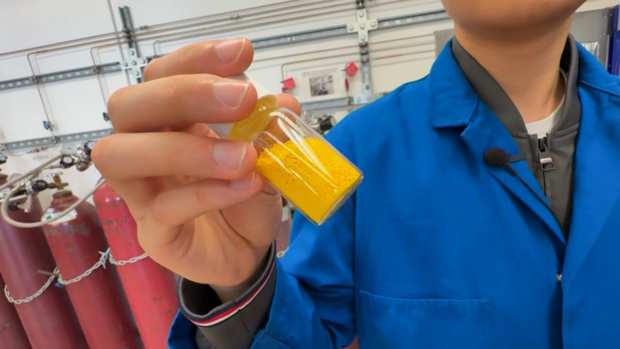UC Berkeley scientists invent compound that can pull CO2 out of the air
Drenching rain, record-breaking heat as well as more severe floods and droughts are now the reality of climate change.
Extreme weather events have become more frequent and intense as greenhouse gases -- primarily carbon dioxide -- continue to surge, further warming the planet. Even if the world immediately stops using fossil fuels, experts warn hundreds of billions of tons of CO2 will remain in the air, causing further damage to the planet.
The goal – even the holy grail – is to bring this gas down to pre-industrial levels. According to NASA scientists, thanks to human activities, the current rise of CO2 levels has reached 422 parts per million. That's 50% higher than what it was before the Industrial Revolution.
Now a bright yellow powder invented at the University of California at Berkeley may just be the game changer humanity needs in the fight against climate change. The results of new research using the powder just got published in the journal Nature.
Zihou Zhou, a fourth year graduate student in the Department of Chemistry, showed CBS New Bay Area the results of his research that pushed air with CO2 in it through a filter with the powder. The high CO2 levels immediately dropped down to zero. The levels began to rise again once the filter was completely saturated.
"I was actually very excited", exclaimed the grad student.
He explained how just half a pound of it removes as much carbon dioxide from the air as a full-grown tree in a year.
Zhou does research in the Yaghi Lab, which is named after the pioneering chemist and inventor Professor Omar Yaghi. When Yaghi saw the grad student's research, he was thrilled.
"I looked at Zihui and I said, 'You have solved society's most pressing problem!'" remarked the reticular chemist.
10 years ago, Yaghi created a material that could suck water out of desert air. Now, thanks to his grad student, the Yaghi lab has now designed a material that quickly sucks carbon dioxide out of the atmosphere.
"It's a monumental problem to take it out of the, air because it's mixed with other gases and it's dilute; although harmful, but dilute. And that makes it a supremely harder problem," explained Yaghi.
The material is a new type of material made out of microscopic pores called a covalent organic framework or COF for short. Zhou tested the compound in a special device by packing the powder into a straw-like cylinder to filter the air.
He first pumped in a mix of gases which included oxygen, nitrogen, and carbon dioxide to simulate air. He also sampled real air, pumped in from just outside the lab at Latimer Hall, from a tube on the balcony overlooking the north side of the UC Berkeley campus.
After hundreds of cycles, the new material worked beautifully. Once the material was saturated with CO2, it can be removed and stored, and the filter used for hundreds of cycles.
"A beautiful result. The air was completely cleansed of C02 and was doing so repeatedly," explained Yaghi.
The next step is to deploy it on an industrial scale. Professor Yaghi told CBS News Bay Area that the filter could directly capture carbon at industrial sites.
Yaghi's carbon-capture start-up called Atoco is ramping up efforts to further develop the technology. The hope is that by directly capturing carbon, that the COF will make us all breathe a little easier.
But, as Yaghi cautions, society also must take drastic action to stop generating new greenhouse gases.








